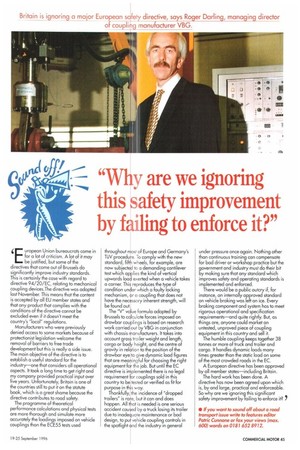"Why are we ignoring this safety improvement by failing to enforce it?"
Page 47

If you've noticed an error in this article please click here to report it so we can fix it.
4 uropean Union bureaucrats come in E
for a lot of criticism. A lot of it may
be .ji.istified, but some of the directives that come out of Brussels do significantly improve industry standards. This is certainly the case with regard to directive 94/20/EC, relating to mechanical coupling devices.The directive was adopted last November. This means that the content is accepted by all EU member states and that any product that complies with the conditions of the directive cannot be excluded even if it doesn't meet the country's "local" regulations
Manufacturers who were previously denied access to some markets because of protectionist legislation welcome the removal of barriers to free trade development but this is really a side issue. The main objective of the directive is to establish a useful standard for the industry—one that considers all operational aspects. It took a long time to get right and my company provided practical input over five years. Unfortunately, Britain is one of the countries still to put it on the statute book, which is a great shame because the directive contributes to road safety. The programme of theoretical performance calculations and physical tests are more thorough and simulate more accurately the loadings imposed on vehicle couplings than the ECE55 tests used throughout most of Europe and Germany's TOV procedure. To comply with the new standard, fifth wheels, for example, are now subjected to a demanding cantilever test which applies the kind of vertical upwards load exerted when a vehicle takes a corner. This reproduces the type of condition under which a faulty locking mechanism, or a coupling that does not have the necesscry inherent strength, will be found out.
The "V" value formula adopted by Brussels to calculate forces imposed on drawbar couplings is based on research work carried out by VBG in conjunction with chassis manufacturers. It takes into account gross trailer weight and length, cargo or body height, and the centre of gravity in relation to the position of the drawbar eye to give dynamic load figures that are meaningful for choosing the right equipment for the job. But until the EC directive is implemented there is no legal requirement for couplings sold in this country to be tested or verified as fit for purpose in this way.
Thankfully, the incidence of "dropped trailers" is rare, but it can and does happen. All that is needed is one serious accident caused by a truck losing its trailer due to inadequate maintenance or bad design, to put vehicle coupling controls in the spotlight and the industry in general under pressure once again. Nothing other than continuous training can compensate for bad driver or workshop practice but the government and industry must do their bit by making sure that any standard which improves safety and operating standards is implemented and enforced. There would be a public outcry if, for instance, an internally approved standard on vehicle braking was left on ice. Every braking component and system has to meet rigorous operational and specification requirements—and quite rightly. But, as things are, anyone could market an untested, unproved piece of coupling equipment in this country and sell it. The humble coupling keeps together 38 tonnes or more of truck and trailer and cargo. It handles dynamic loads many times greater than the static load on some of the most crowded roads in the EC.
A European directive has been approved by all member states—including Britain. The hard work has been done. A directive has now been agreed upon which is, by and large, practical andenforceable. So why are we ignoring this significant safety improvement by failing to enforce it? /








































































































